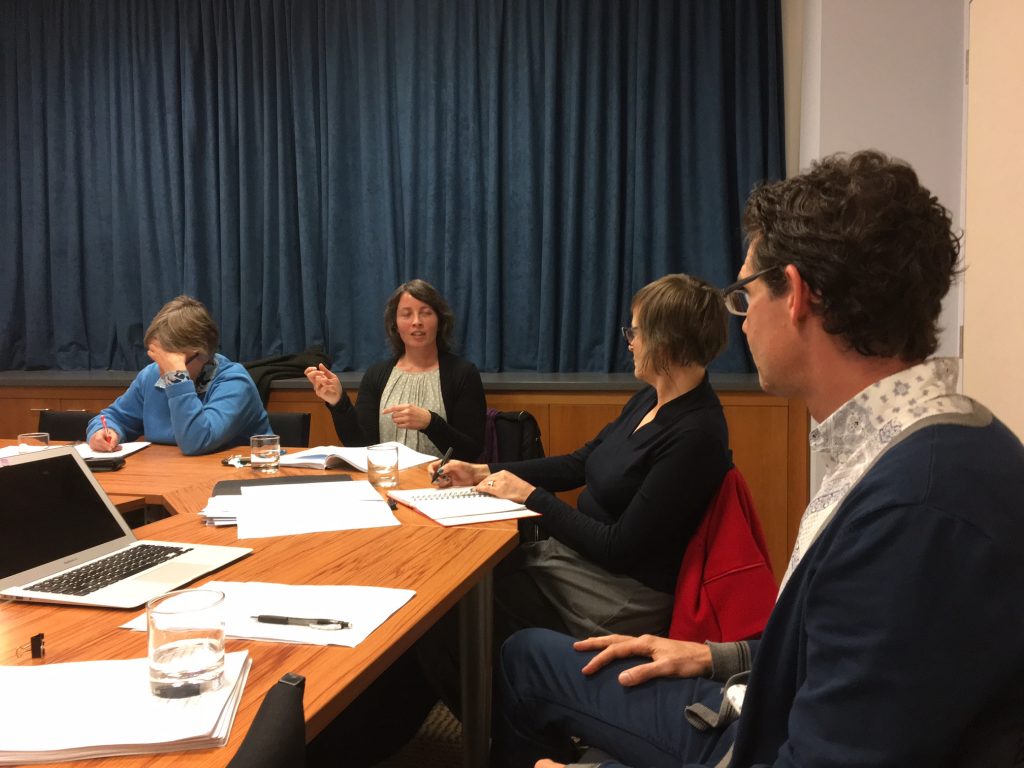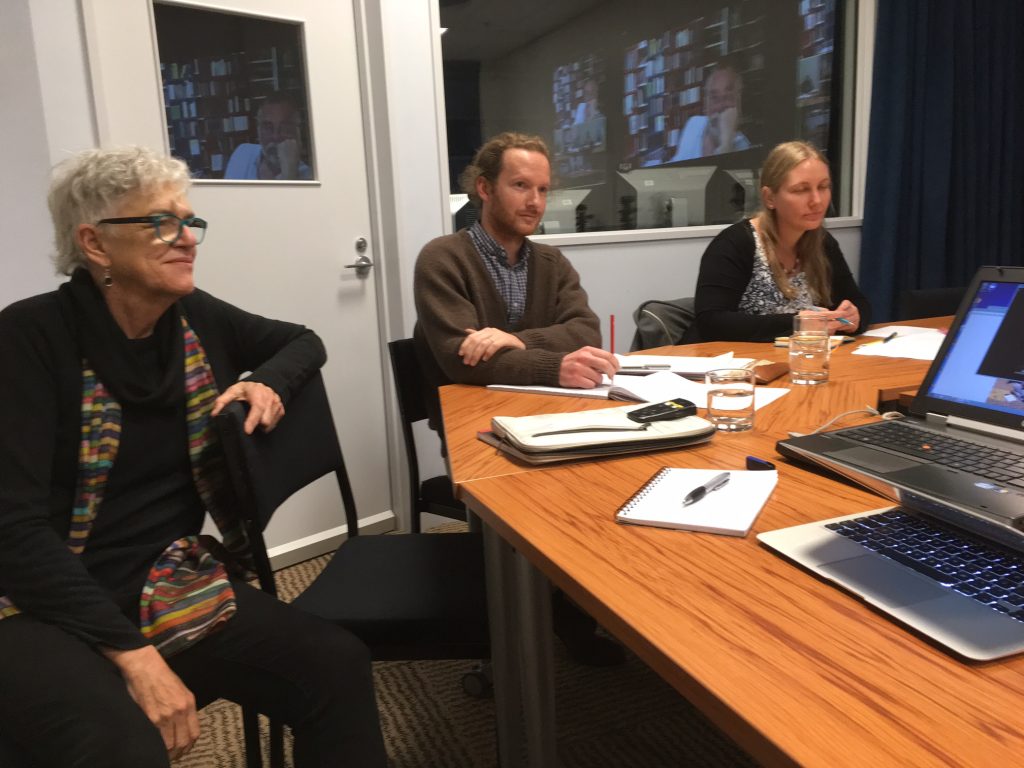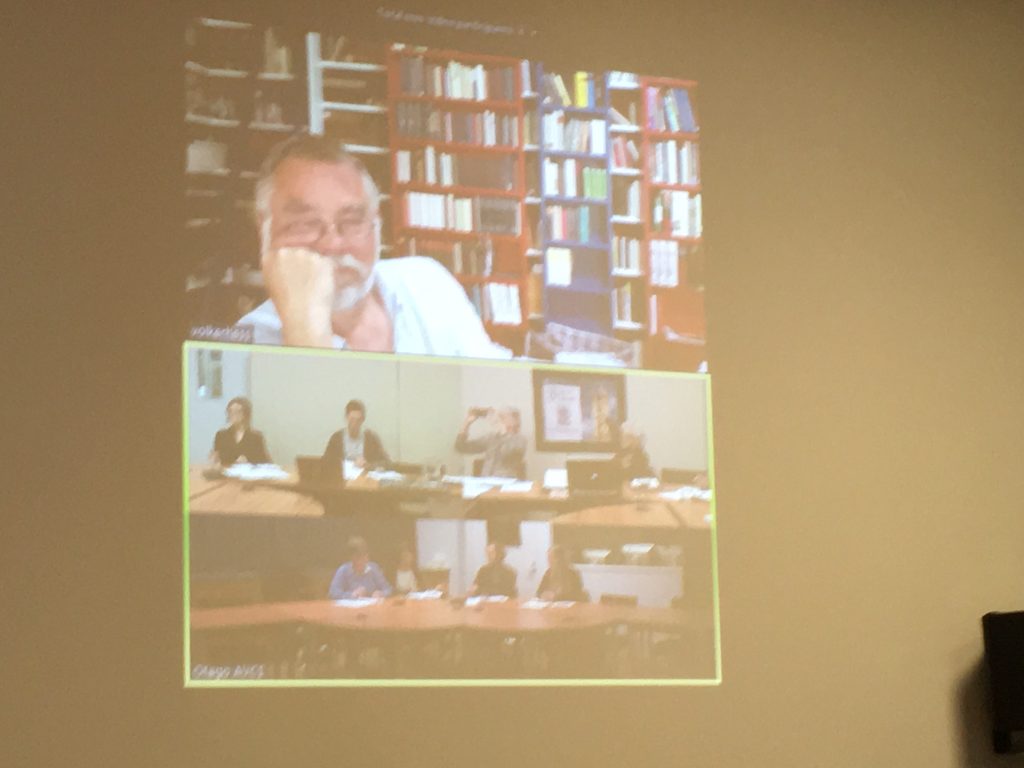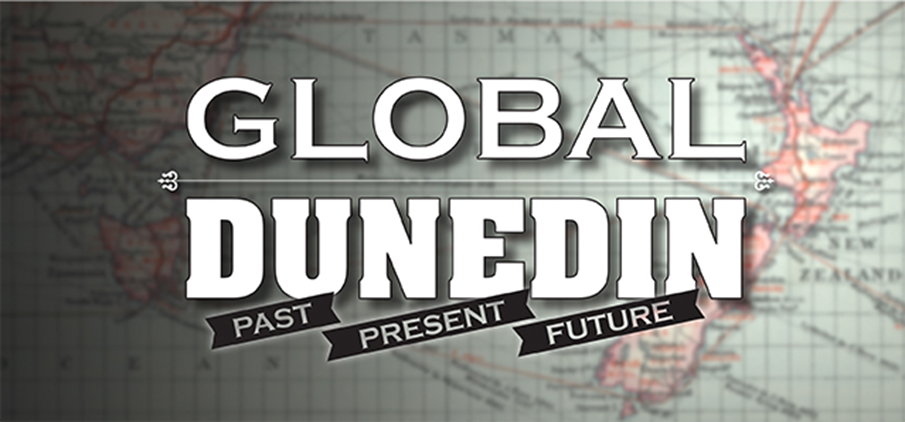Scotland’s Colony?
The Centre for Irish and Scottish Studies is hosting a one-day FREE symposium at the Hocken Collections on Monday 16 December from 9.30am on ‘Rethinking Otago’s Caledonian Connections’. There’s a great line-up of speakers and topics, which are listed below.
Session 1 (9.30-10.45): Texts and Contexts
Catriona MacDonald (University of Glasgow)
‘Exporting the past, historicising the nation: making histories in Scotland and New Zealand’
Ben Wilkie (CISS, Otago)
‘Scotland’s Antipodean Archipelago: The Otago Settlement and its Australasian Context’
Session II (11-12.15): Scottish Institutions in Otago and New Zealand
Valerie Wallace (Victoria University of Wellington)
‘Scots Law and British Colonialism in New Zealand’
Liam McIlvanney (CISS, Otago)
‘Scottish Presbyterianism in Early Otago: Thomas Burns and D.M. Stuart’
Session III (1.45-3): Print Culture Between Scotland and Otago
John Stenhouse (Otago)
‘Sam Lister, the Otago Workman Newspaper and Denominational Tensions in Late Nineteenth-Century Dunedin’
David Goldie (Strathclyde)
‘From Lee to Lea: Imperial Hybridity in Scottish and New Zealand Poetry of the First World War’
Session IV (3.15-4): A Roundtable discussion on Scotland’s Colony? To what extent was Otago a Scottish Colony? How does Otago complicate our understanding of Scotland’s involvement in Empire?
Archival Files and Knowledge Production Workshop
The Centre hosted a very successful workshop on May 30 & 31, organised by Barbara Brookes, addressing the creation of archival files, the way individual lives get written into such files, the serendipity (or otherwise) of the survival of such paperwork, how it gets ordered, and how such files might make it possible to create claims on the state. Participants also considered the origins of files in book-keeping work and their ongoing life in the digital realm and asked how different forms of accessibility might alter our engagement with files and what might be lost when the original ordering becomes subservient to digital imperatives, such as the great demand by genealogists.
The writing of history is shaped by its sources. Workshop participants spent two days thinking about how those sources shape narratives within institutions, at the national level, and for the individual. Jane McCabe, from the Department of History and Art History at Otago, linked an institution, a number of countries and personal narratives in her paper which is based on an archive that continues to shape lives in the present. Rosi Crane, an Honorary Research Fellow at Otago Museum and a graduate of the Department of History and Art History at Otago, who has been working on the project for Barbara, attended and presented her thoughts near the end of the workshop.

Rosi Crane takes notes as Jane McCabe discusses her paper while Kate Hunter and James Moran listen attentively.
All workshop participants considered this on-going relationship with archives, how historians use them to create coherent stories and how paper trails both serve to highlight some kinds of knowledge and elide others. The Centre was delighted to welcome to the Otago campus James Dunk from the University of Sydney, James Moran from the University of Prince Edward Island, Sally Swartz from the University of Capetown, Kate Hunter and Rebecca Lenihan (with Charlotte Macdonald there in spirit) from Victoria University of Wellington. and Volker Hess, from the Charité – Universitätsmedizin Berlin, who joined the workshop by zoom for three hours of intense discussion of pre-circulated papers.
Congratulations to Barbara Brookes on putting together a fantastic programme of speakers. We look forward to seeing the publication of these papers in a special journal issue in the near future.
REMINDER: CFP, Film in the Colony Symposium
Don’t forget the Film in the Colony Symposium, to be held in Wellington, 13-14 July.
https://blogs.otago.ac.nz/crocc/film-in-the-colony-symposium/
If you are interested in presenting a paper, send a 200-word abstract and a brief bio to: filminthecolony@otago.ac.nz by 28 February 2017.
CFP: Film in the Colony
On 13 and 14 July 2017, the Centre for Research on Colonial Culture and Ngā Taonga Sound and Vision are hosting the Film in the Colony Symposium in Wellington.
Keynote Speakers: Dame Professor Anne Salmond (University of Auckland), Dr Ian-Malcolm Rijsdijk (University of Cape Town)
Organisers invite papers that investigate the cross-cultural processes of film production in the colonial context, and the ways in which indigenous and settler participants – performers, crew, or people from the localities where filming took place – took part in productions. In focusing primarily on New Zealand, South Africa and Australia, the symposium also seeks to develop a comparative analysis of the means through which film contributed to the making of national stories in the late colonial era, and how indigenous communities within these colonies engaged with the first few decades of film culture.
Contributions from a variety of disciplines and backgrounds are welcome, such as film studies, history, Māori and/or indigenous studies, anthropology, archives, screen industries, and communities.
Send a 200-word abstract and a brief bio to filminthecolony@otago.ac.nz by 28 February 2017.
Convenors: Annabel Cooper (Centre for Research on Colonial Culture, University of Otago), Diane Pivac, Honiana Love (Ngā Taonga Sound and Vision), Minette Hillyer, Jo Smith (Media Studies, Victoria University of Wellington).
PhD Scholarship: Literary and Book History after Colonialism
University of Queensland’s Institute for Advanced Studies in the Humanities has a number of doctoral scholarships available. These are attached to specific projects, and you can find out more about them here. Of particular relevance to Centre followers is Project 3: Literary and Book History after Colonialism, led by Associate Professor Anna Johnston and attached to her ARC Future Fellowship.
Australian settler modernity was shaped by distinct orders of knowledge that can be traced through book history and studies of print culture. The key aim of Associate Professor Anna Johnston’s ARC Future Fellowship project is to provide fresh and challenging readings of Australia’s literary and cultural history, and to map the aftermath of colonialism in contemporary culture.
Successful applicants will be supervised by Associate Professor Anna Johnston, and will be enrolled in the School of Communication and Arts. While all relevant dissertation projects will be considered, proposals that articulate with Fellowship themes and approach are encouraged. Indicative projects could include:
- Settler colonialism and Australian literature, past and present
- Colonial science and natural history publications
- Missionary writing
- Archival or book history projects, particularly using UQ’s Fryer Library and / or AustLit
- Non-fictional prose and literary studies
Students in literary studies, cultural and intellectual history, and postcolonial cultural studies are encouraged to apply and to refine their proposal in consultation with the project leader.
Orphanages, Residential Schools, Colonial Gossip
All of these topics will be discussed at a half-day symposium on “Colonial Families: New Perspectives” taking place on Thursday 20th August from 9-12 in Central Library Seminar Room 3, University of Otago. This event is sponsored by the Centre for Research on Colonial Culture, with support from a Royal Society of New Zealand Rutherford Discovery Fellowship and features four speakers who will present new research into the history of the family in Canada, New Zealand and the Pacific:
Laura Ishiguro’s (University of British Columbia) research is trans-imperial and global in scope. She will speak about colonialism, mobility, and intimacy in the “long” nineteenth century through the story of one Metis family from British Columbia. Her talk draws upon her SSHRC-funded research project, “Settler colonialism, global families, and the making of British Columbia, 1849-1871″ (Insight Development Grant 2014-16). She guest-edited a 2013 issue of the Journal of Colonialism and Colonial History on “Imperial Relations: Histories of Family in the British Empire,” and in it called for a rethinking of the meanings of, and relationships between, family, intimacy, and imperialism.
Crystal Fraser (University of Alberta) is a high-profile young Gwich’in scholar who is undertaking research on the impacts of colonialism on her home community, Inuvik, located in northern Canada. She has been identified as “one of the most important Canadian historians of the next generation” whose research on residential schools, gender, and sexuality in Gwich’in society and the Canadian North is “actively shifting both fields as aboriginal people and northerners start writing and directing research in their own history on their own terms”. She is also a leading voice in Indigenous social media, which included hosting @IndigenousXca where she discussed racism in Canadian academia. Crystal will speak about the current debates within Canadian history and society about residential schooling.
Jennifer Ashton (Auckland) will speak about family, race and respectability in northern New Zealand during the nineteenth century. Jennifer’s talk draws from her recently published, and highly regarded first book, At the Margin of Empire: John Webster and Hokianga, 1841-1900 that “takes us into Hokianga to reveal how the evolving intimate relationships and economic transactions of everyday life reflected larger shifts in colonial power” through a biography of the trader and colonist John Webster and his networks.
Erica Newman (Otago) will talk about her original and exciting doctoral research on orphanages and adoption in colonial Fiji. Erica’s research in this area has been recognized internationally in the form of invitations to participate in pre-read workshops at the Berkshire Conference of Women Historians, and an invited publication on her previous work on Māori adoption in the highly regarded American Indian Quarterly.
Contact Dr. Angela Wanhalla (angela.wanhalla@otago.ac.nz) for further information about this free event.
An exciting symposium on colonial childhood
The Centre for Research on Colonial Culture is hosting a free two-day symposium, ‘Unpicking the tapestry: children and young people in British colonial contexts’, comprising 16 different papers on this theme by a range of scholars from New Zealand, Australia, Canada, and the USA, and with roundtable discussions to end each day’s sessions. This will be held in the Seminar Room, Hocken Collections, 24-25 August. Click here for the Draft Programme.
As part of this event, Dr Kristine Alexander of Leithbridge University, a Canada Research Chair in Child and Youth Studies, will be giving a public lecture, “A Tangled Web: Childhood, Colonialism, and Archives”. This will be be held in Burns 2, 24 August at 5.30pm. All interested people are warmly invited.
In particular the symposium is interested in addressing a number of key questions which include: What does it mean to talk about ‘colonial childhoods or adolescence’ or to think about children and young people in relation to colonialism? What colonial sites were significant or influential for children’s and young people’s lives, and in what colonial sites were children influential? To what extent were children and young people constrained by boundaries or moved fluidly across boundaries (eg. gender, race or ethnicity, nation, class, religion), and to what effect? What are the sources for excavating and interpreting colonial childhoods? What are the gaps and silences? How do we negotiate these? In what ways might a comparative approach (across colonial societies) expand or limit our understanding of colonial childhoods and adolescence? What are the significant challenges and opportunities in this field of academic enquiry?
If you are interested in attending the symposium, please contact hugh.morrison@otago.ac.nz by the end of the month.
Two MA scholarships offered
Are you interested in New Zealand history? Are you looking for scholarship funding? If you have a BA (hons) first class in History or Māori Studies then you’re in luck. Two Centre members, Michael Stevens and Angela Wanhalla, are seeking applicants for MA scholarships attached to their respective Royal Society of New Zealand research projects. See the details below for further information.
MA Scholarship in New Zealand History
History or background of award
The scholarship is attached to a Rutherford Discovery Fellowship project led by Dr. Angela Wanhalla (Department of History and Art History, University of Otago) on ‘The Politics of Intimacy in New Zealand History’, and funded by the Royal Society of New Zealand.
Purpose of award
Applications are invited from suitably qualified students interested in working on an aspect of private life and the law, particularly associated with the governance and control of marriage in New Zealand, during the nineteenth and/or twentieth centuries. Potential areas of investigation include, but are not limited to: marital violence; bigamy; arranged marriage; customary marriage and the law; cross-cultural relationships and the law; Māori marriage; co-habitation; marital property.
Selection criteria
The successful applicant will have a BA honours (first class), or equivalent in History. A background in New Zealand history is preferred.
Number of awards offered
One
Value
$16,000 stipend, plus tuition fees
Tenure of award
One year, or two years part-time.
Start date:
You may begin the thesis at any stage during 2015, or by 1 July 2016 at the latest.
Further Information
Please send a cover letter, a copy of your academic record, a thesis proposal, and a sample piece of writing to Angela Wanhalla (angela.wanhalla@otago.ac.nz) by 22 June.
MA Scholarship in New Zealand History
History or background of award
The scholarship is attached to a Marsden Fast-Start project led by Dr. Michael Stevens (Department of History and Art History, University of Otago) entitled ‘Between Local and Global: A World History of Bluff’, which is funded by the Royal Society of New Zealand.
Purpose of award
Applications are invited from suitably qualified students interested in working on an aspect of maritime history, ideally with a focus on southern New Zealand and/or with a strong Māori focus, during the nineteenth and/or twentieth centuries. Potential areas of investigation include, but are not limited to: cargo handling; port development (e.g. reclamation; pilotage; built environment); boat-building; commercial fishing; crew culture; marriage patterns; mahinga kai; gendered occupations; intergenerational family businesses; associational culture; religion; class conflict (e.g. strikes and lockouts).
Selection criteria
The successful applicant will have a BA honours (first class) or equivalent, in History or Māori Studies. A background in New Zealand history is strongly preferred.
Number of awards offered
One.
Value
$16,000 stipend (paid in monthly installments), plus tuition fees.
Tenure of award
One year.
Start date:
You may begin the thesis during any stage of 2015, or by 1 March 2016 at the latest.
Further Information
Please send a cover letter, a copy of your academic record, a thesis proposal, and a sample piece of writing to Michael Stevens (michael.stevens@otago.ac.nz) by 22 June.
Narratives of Colonial Conflict
This afternoon CRoCC member Associate Professor Annabel Cooper is presenting her research in the Department of Sociology, Gender and Social Work seminar series. The topic is ‘Narrating Colonial Conflict in the Early 1980s: Some Reflections on the Culture Moment of Utu‘. Her seminar examines how Utu re-makes the colonial past within a tumultuous present. It traces the film’s links to a series of documentaries of the same era, including Bastion Point – Day 507 (Mita, Narbey, Pohlmann, 1980), The Bridge – A Story of Men in Dispute (Pohlmann, Mita, 1982), and Patu! (Mita, 1983), and to the drama series The Governor (1977); and it investigates the contributions of significant individuals involved in the production, including Keith Aberdein, Wi Kuki Kaa, Merata Mita, and Anzac Wallace.
Annabel’s seminar begins at 3pm this afternoon at 530 Castle Street (530 C1).
Introducing Global Dunedin
March 23 is Otago Anniversary Day, but it also happens to be the occasion for the launch of a new initiative from the Centre for Research on Colonial Culture: Global Dunedin. Have a look at Global Dunedin’s Blog, which is designed to serve as a forum for discussing Dunedin’s historical development and its changing economy, social life, and cultural pattern. The project will showcase how the city has changed over time and the ways in which its pasts have shaped its current and future prospects. The blog – together with an associated Facebook page and Twitter account (@GlobalDunedin) – will disseminate reflections on the city’s history and life here now.
In addition to a social media presence, the Global Dunedin project team are also running a public lecture series in conjunction with Toitū Otago Settlers Museum: in these Sunday afternoon talks, leading local researchers and thinkers will reflect on different aspects of Dunedin’s past and present.
Follow us and join in the conversations!





